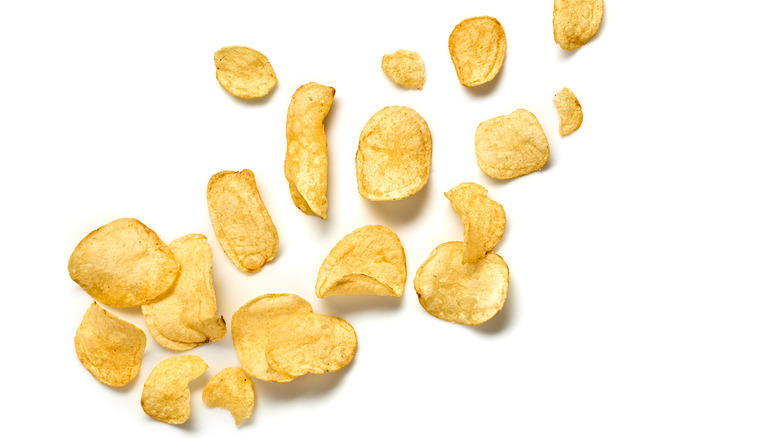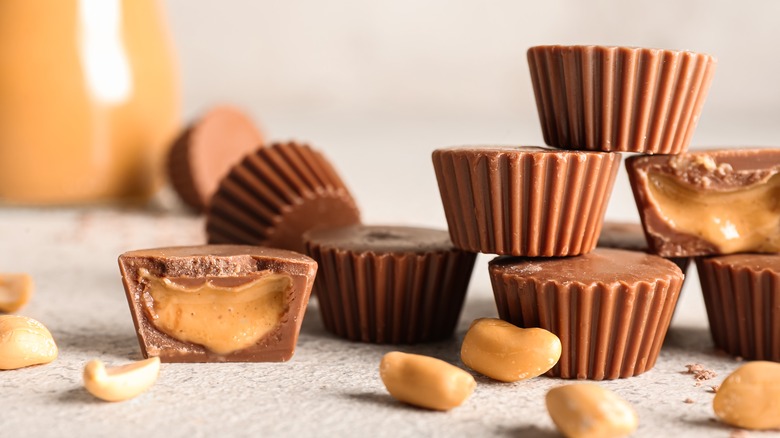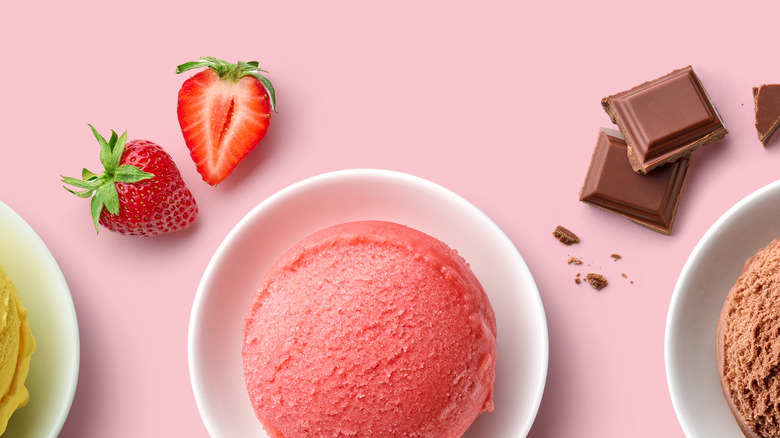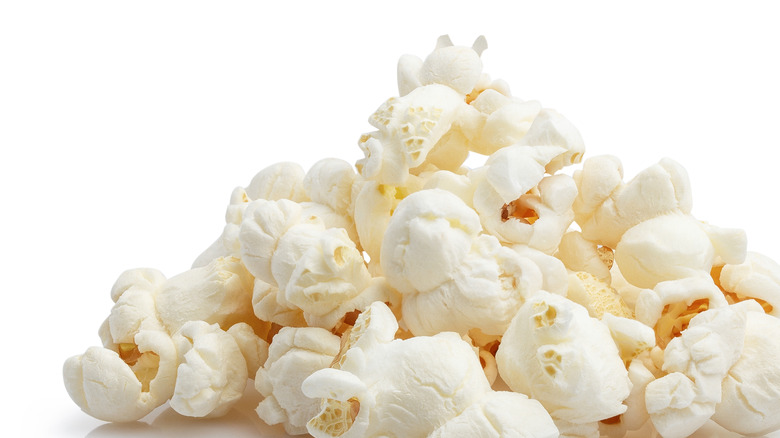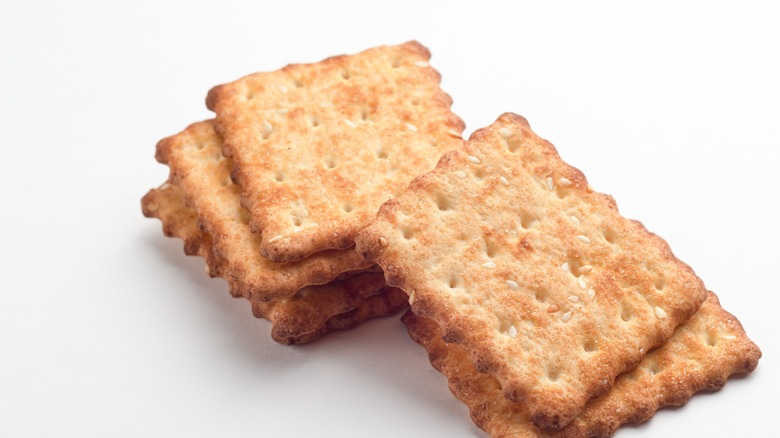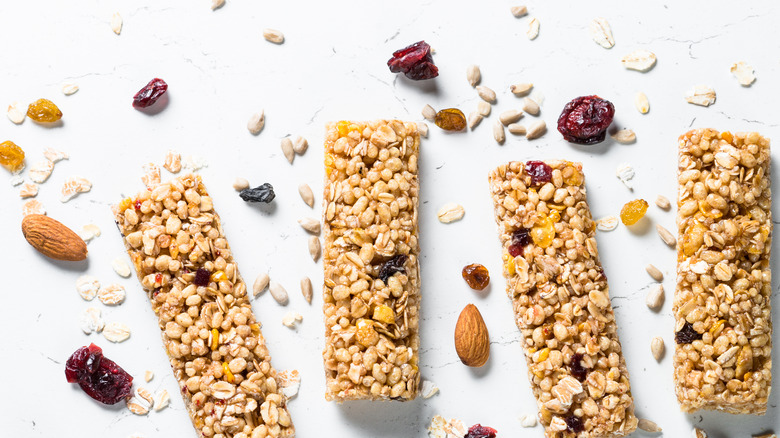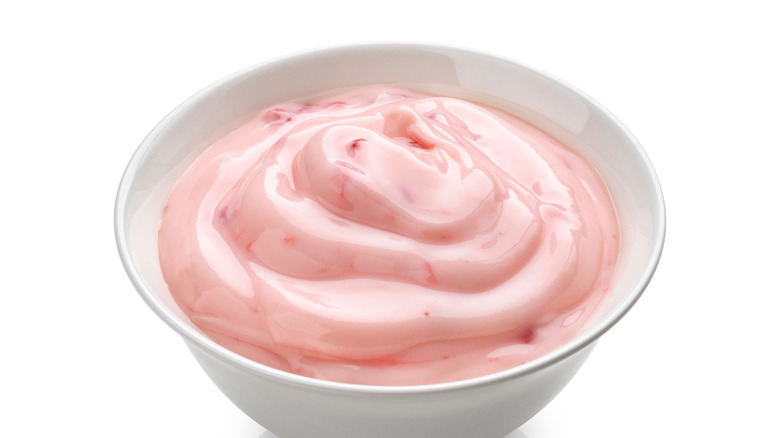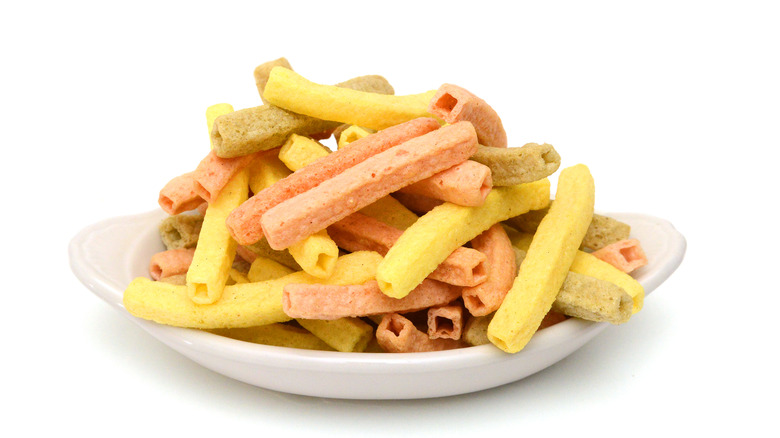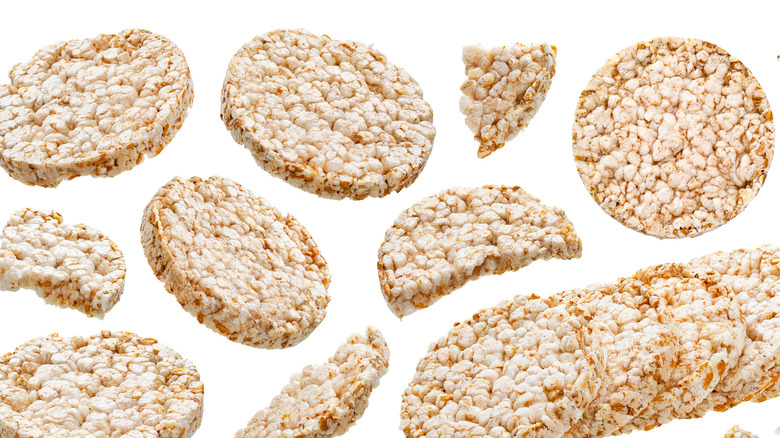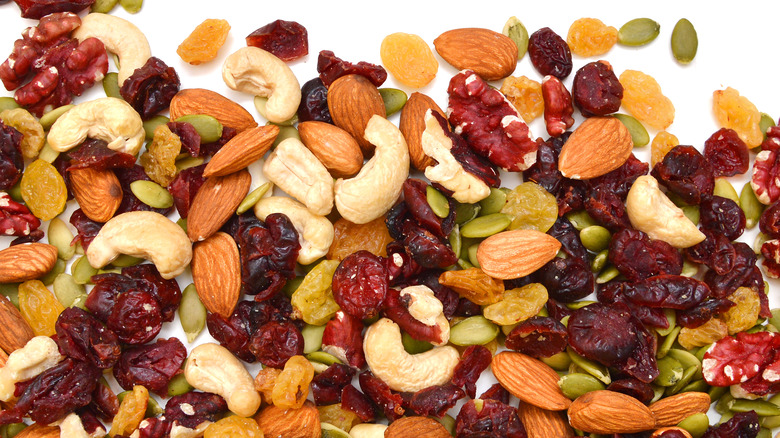Organic Foods That Aren't Actually Good For You
With so much information about diets and food choices available, it can be hard to sift through the misinformation and get the facts. What's beneficial one day is often touted as unhealthy the next. In many ways, a lot of information on organic food has fallen into the realm of "is it true, or is it not?" resulting in considerable confusion.
According to Healthline, the term organic refers to the production method, meaning that the food has been produced without artificial chemicals such as herbicides or pesticides, and without hormones, antibiotics, and genetically modified organisms. Furthermore, it must also be free of artificial ingredients including sweeteners, coloring, flavors, etc. For the earth, some of the benefits of organic production include improved soil health, helping to conserve groundwater, and a potential reduction in pollution. Because of the way organic fruits and vegetables are grown, they have also been shown to have a higher percentage of nutrients.
With that said, there are many times when the organic production method doesn't necessarily make up for the fact that a food item is loaded with fat, sugar, or devoid of any nutritional benefits (via Harvard Health). If you want to stay healthy, staying away from certain foods stamped with the organic label is a must. Continue reading to discover those foods that may not be as healthy as they seem.
Potato chips
It's no secret that potato chips fall into the category of junk food. But does the organic label somehow offset the negative effects of all that processing and deep frying? The answer, unfortunately, is no. Frank Hu, professor of nutrition and epidemiology at Harvard University spoke to the Huffington Post about the organic myth, and explained, "Being organic itself will not offset the detrimental effects of many ultra-processed foods, which are typically loaded with added sugars, sodium and refined starch." As delicious as potato chips are, Livestrong confirms that they have "little nutritional value," and can contribute to weight gain and other negative health consequences.
The good news is that having them occasionally may not cause major problems — making them a regular part of your diet is when the problems start. Furthermore, buying organic chips and thinking they're healthier may lead to overeating.
Experts at Livestrong also explain that chips are often loaded with sodium, which can contribute to increased blood pressure and heart disease. Because they are fried in oil, they tend to be very high in fat, including unhealthy saturated fats. Furthermore, whatever additional nutrients may have been made available from the organic production process are basically eliminated during the frying process.
Nut butter cups
Peanut butter and chocolate are a classic, time-tested duo that probably won't be going anywhere anytime soon. Having one as a treat every now and then may be okay, but loading up under the guise of them being a health food? — not so much. While recognizing that peanut butter cups are essentially a combination of two very-good-for-you foods, the experts at Eat This, Not That! also explain that most of the time, peanut butter cups are loaded with additional sugar, sky rocketing their calorie content to unhealthy levels.
According to the Justin's website, one packet of their organic milk chocolate peanut butter cups contains a grand total of 230 calories and 15 grams of fat, 8 grams of which are saturated, representing 40% of the daily recommended value. Furthermore, a packet contains 16 grams of sugar, all of which are added.
Comparing this to the non-organic alternative, Reese's Peanut Butter Cups contain 220 calories, with only 13 grams of fat, 4.5 of which are saturated. Reese's does, however, have a considerable amount of sugar added, with 22 grams per serving. If you want to enjoy the peanut butter chocolate combo in a healthier way, the experts at Livestrong suggest making your own at home, giving you more control of the level of sugar and added fats.
Cookies
A delicious, chewy chocolate chip cookie is the stuff dreams are made of. While it can be hard to resist temptation, speeding up past the cookie aisle at the grocery store may spell out better health for you in the long run — organic or not. Balu Nayak, associate professor of food processing at the University of Maine spoke to the Huffington Post and explained that in the case of organic packaged cookies "the baking temperature of dough is high enough to degrade or destroy most of the nutrients. Hence, it does not matter whether the wheat flour is organically or conventionally grown."
So what exactly ends up happening if you go overboard with cookies? Eat This, Not That! experts explain that it could potentially lead to long term health problems, such as obesity and type-2 diabetes. Furthermore, a study published by the Journal of American Medical Association found that eating a diet with 10% or more of added sugar contributed to the mortality rate from cardiovascular disease. Eat, This, Not, That! explains that you may also find your tummy rumbling not long after you've eaten cookies, as they often lack a key ingredient that helps keep you full for longer: fiber. For example, Annie's Chocolate Chip Cookie Bites contain only 1 gram of fiber per serving, which is only 5% of the daily recommended value.
Ice cream
"I scream, you scream..." you probably know the rest of the song. Ice cream is another classic American favorite that, well, isn't known for being the healthiest. Despite its popularity, ice cream is relatively high on the list of offenders for being high in fat, sugar, and calories. According to The Spruce Eats, ice cream is made from the classic trio of milk, cream, sugar, as well as other flavorings that are churned together to create a creamy texture. Ice cream in the United States is required to have 10% to 15% milk fat, and ice cream that is considered organic requires the use of organic milk.
Healthline explains that while there are some advantages to consuming organic milk, such as "slightly higher" levels of vitamin E, iron, and omega-3 and omega-6 fatty acids, overall the nutritional benefits of the two are relatively similar.
Because organic ice cream doesn't automatically mean low fat or low sugar, when eating organic ice cream you are still consuming a similar amount of calories, fat, sugar, and carbs when compared to conventional ice cream. Another Healthline article points out that a 1/2-cup serving of premium ice cream comes in at 210 calories per serving, with 13 grams of fat, 70 milligrams of cholesterol, 20 grams of carbs, and 19 grams of sugar.
If you want to enjoy ice cream in a healthy way, try controlling your portions, finding brands with less added sugar, or making your own version at home.
Mac n' Cheese
For many, macaroni and cheese is a childhood favorite and is considered a classic dish for lots of Americans. The combination of cheese, starchy pasta, and cream make it a highly addictive and comforting food. Before we break down exactly why mac n' cheese may not be the best food to eat every day, let's unpack exactly what's hiding in it. According to Healthline, macaroni and cheese is a combination of pasta, cream, cheese, and butter. While the calorie count may vary depending on the brand and method of preparation, it's safe to say that mac n' cheese is not a low-calorie treat. When prepared organically, all the ingredients from the butter, pasta, and cheese must all be organic.
And while the milk used to make the cream, cheese, and butter may be organic, it still has the same amount of calories and fat as regular milk. When it comes to the pasta, another Healthline article points out that organic or not — most people are consuming refined pasta, which means that the kernel of the wheat used to make the pasta has been removed, stripping it of most of its nutrients.
Furthermore, refined pasta has more calories, and less fiber, making it less filling than whole wheat. If you want to make a healthier choice when it comes to mac n' cheese, experts at Everyday Health suggest using whole-wheat or grain-free options, using less cheese, and adding in fresh veggies.
Soda
The dangers of drinking soda have been discussed at length. Most people probably already know that it's loaded with sugar and calories, and is to be avoided in excess ― but does drinking organic soda make it any better? The experts say, not so much. Mary Camire, professor of food science and human nutrition at the University of Maine, spoke to Huffington Post and explained, "The specific source of sugar may not be very important to the person's overall health. Long-term high consumption of fructose from any source ― organic or not ― can lead to insulin resistance, fatty livers and many other health problems, and so can excessive sucrose consumption, whether the sugar comes from sugar cane or beets."
Furthermore, experts at WebMD have expressed concern about the marketing tactics used by beverage companies to position soda as "sparkling beverages" that can be good for your health, potentially including organic beverage producers in the mix. Experts at the site explain that because consumers are searching for more "healthy looking" food, they may be attracted to products that claim they are healthier than conventional soda, when in fact, they are just as bad for your health.
Buttery popcorn
What's not to love about a bowl of delicious, buttery popcorn? Well, perhaps the excessive amount of calories and saturated fat to start. In moderation popcorn can actually be a healthy treat packed with vitamins and minerals (via Medical News Today). But eating it mindlessly in excess or loading it up with butter turns what could be a healthy snack into trouble.
Kylie Ivanir, registered dietitian with Within Nutrition, spoke to Eat This, Not That!, and explained just why the extra butter is no good. "Butter is high in saturated fat which, when combined with carbohydrates, creates a 'sweet fat.' This highly palatable combination can result in over-consumption, interfering with the body's ability to regulate appetite and leading to enhanced cravings. This combination of carbohydrates and saturated fat can also put the body in fat-storing mode."
A nutritionist spoke to Healthy Food Guide and answered a question from a reader regarding whether organic butter was better than conventional butter. You may be able to guess how she responded. The expert explained that the "energy and fat content is no different" between the two, and that organic butter is still filled with saturated fats, which are linked to heart disease. If you want to snack on healthier popcorn, your best bet is to hold the extra butter and to eat it in moderation.
Crackers
Crackers are an ideal snack food in many ways because they can be eaten alone or combined with sweet or savory toppings and dips for added deliciousness. While some crackers can be on the healthier side, others offer little nutritional benefit and are made with a considerable amount of butter, salt, and other unhealthy oils, according to experts at Verywell Fit. Organic crackers follow the same rules as all the other organic items on this list, meaning that the organic flour they are made with does not necessarily make them healthier. This is especially true for crackers that are not made from whole wheat and whole grains.
Experts at the site explain that to select a healthy cracker, it's best to look closely at the nutrition label for ingredients such as whole grains, and make sure the crackers contain a significant portion of fiber. Verywell Fit says, "Look for crackers that are made from ingredients such as vegetables, whole grain flours, nuts, and seeds." Furthermore, it's important to be aware of what you're adding on top of your cracker as to not let the calories pile up. If you've selected an organic cracker but overdo it with cheese or dips loaded with saturated fat, you're essentially undoing any good intentions. Experts at Verywell Fit suggest healthy toppings to get the most out of your snacking experience.
Granola bar
Granola bars are one of those foods that appear healthy on the surface, but can be filled with hidden sugar and fat. Healthline explains that while some options can be healthy to snack on between meals, others are just as high in calories and sugar as a regular candy bar. Not so good for that diet, right? Some of the ingredients you might find in a granola bar include oats, dried fruit, nuts, seeds, sweeteners such as honey, and perhaps even chocolate.
While Healthline explains that nutritional value will vary depending on the brand, they will typically net you anywhere between 100 to 300 calories each. For the granola bars on the higher end of the calorie spectrum, the culprit is typically added sugar and vegetable oils. If you decided on an organic granola bar because you think it's healthier, the best thing you can do, as always, is check the nutrition label first. Things to look out for on the label include 10 grams or less of sugar, a minimum of 5 grams of protein and 3 grams of fiber.
Furthermore, you might want to avoid granola bars that list sugar as one of the first three ingredients, as that means they contain a high amount.
Sugary yogurt
Yogurt is considered a healthy food in many ways. Livestrong experts explain that while yogurt's beneficial ingredients include a significant amount of protein, calcium, and probiotics, not every yogurt deserves the health food title it's been given. Organic yogurt relies on organic milk and other additives — and while yogurt in its most basic form is generally pretty healthy, some of those add-ons are not so much (organic or not). The site explains that fruit-flavored yogurts are typically made with added sugar, which as mentioned can lead to weight gain, type-2 diabetes, and a host of other health problems. For example, this organic yogurt from Stonyfield with blueberries on the bottom contains 16 grams of sugar, 9 grams of which have been added.
Livestrong explains that milk and fruit contain natural sugars, but also bring an abundance of other nutritional benefits including fiber, vitamins, minerals, and antioxidants. However, when sugar is added during its processing, yogurt makes a transition from a health food into somewhat of a dessert. Experts say there are more than 60 names that sugar may appear as on the nutrition label, so it's important to learn those names in order to avoid them (via UCSF).
Candies
Who doesn't love a delicious piece of candy? Having a piece as a treat once in a while may be fine, but if you're under the impression that an organic label will somehow turn a sugar-loaded snack into something more innocent, it's probably best to think twice. For example, these organic gummy bears from Black Forest contain 14 grams of sugar per serving, 100% of which are added. Not to mention the self-control required to make sure you don't double or triple your serving size. As you can see on the label, while organic, the first ingredients are still tapioca syrup and cane sugar.
Livestrong experts explain that tapioca sugar is still an added sugar, and that it needs to be consumed in moderation despite it being organic. Another Livestrong article points out that in addition to sugar, saturated fats may be another concern when it comes to eating candy. This is typically true for candies like candy bars that have milk chocolate, which may contain up to 11 grams of saturated fat per serving. Eating candy like this makes it easy to go over your daily recommended value after eating your meals.
Veggie straws
You may have seen veggie straws while perusing the organic aisle, or stuck somewhere in between the bags of potato chips you usually buy. At that moment you may have thought silently to yourself, "What the heck is that?" and "Do they actually taste good?" While the first question is easy to answer, the second one is entirely up to your taste buds. According to an article written by a registered dietician for Eating Well, veggie straws are made with potato starch, potato flour, vegetable oil, spinach powder, and tomato paste among other ingredients.
According to the website of Sensible Portions, these organic veggie straws contain approximately 130 calories, 7 grams of fat, 220 milligrams of sodium, 17 grams of carbs, less than 1 gram of protein, and 0 grams of fiber. The article points out that in contrast, potato chips offer 160 calories per serving, with 10 grams of fat, 170 milligrams of sodium, 15 grams of carbs, 1 gram of fiber and 2 grams of protein. Comparing the two side-by-side, it's clear that potato chips are the winner in terms of health benefits for at least providing some fiber and protein (though nominal) paired with less sodium and fewer carbs. The expert says if you want to indulge, it's probably best to eat the potato chips and lay your snack craving to rest.
Rice cakes
Rice cakes have been branded as a healthy food and gained popularity in the '90s as a part of a low fat diet, according to experts at Healthline. This popular snack is made when rice is puffed and then "pressed together" to form a cake-like disc that ends up being quite low in calories. The classic flavor only contains a small amount of added salt, and the resulting cake ends up being bland in flavor, note experts. At only 35 calories per serving, with 7 grams of carbs, 0 grams of fiber, 1 gram of protein, and 0 grams of fat, rice cakes are clearly a low calorie treat, but are lacking in the nutritional department.
One of the negative side effects of eating rice cakes is that they may send your blood sugar skyrocketing because of their carbohydrate content. Experts explain that this happens because rice cakes do not have enough protein or fiber, which can both help slow down the effect carbs have on your blood sugar levels. Furthermore, the site adds that when rice cakes, such as these organic ones from Lundberg Family Farms contain flavors, the calorie content and the sugar tends to increase. If you want to balance out the carbs, the site suggests adding more protein and fiber as a topping to your plain rice cake, such as hummus and cucumbers, cream cheese and salmon, or sliced turkey and tomatoes.
Trail mix
Trail mix is a seemingly healthy snack that can end up packing on a lot of extra calories if you're not careful. Healthline explains that its popularity is largely due to its convenience, the delicious flavor, and the fact that it tends to be filling. Initially created as a snack for hikers, trail mix typically contains a mixture of nuts, dried fruit, and occasionally granola. Depending on the brand, it may also include ingredients such as popcorn, candy, chocolate chips, added sweeteners, and other seasonings.
If you are looking to cut back on calories and sugar, Healthline adds that certain trail mixes should probably be avoided, as most of its ingredients are "calorie dense" such as the nuts and dried fruit.
This packet of organic trail mix from O Organics, for example, contains 170 calories per serving, with 11 grams of sugar, 9 grams of which are added. Healthline explains that portion control is your best bet with these types of trail mixes to avoid overdoing it.


